Treasure in the Ditches: Time to Forage for Wild Elderberries!
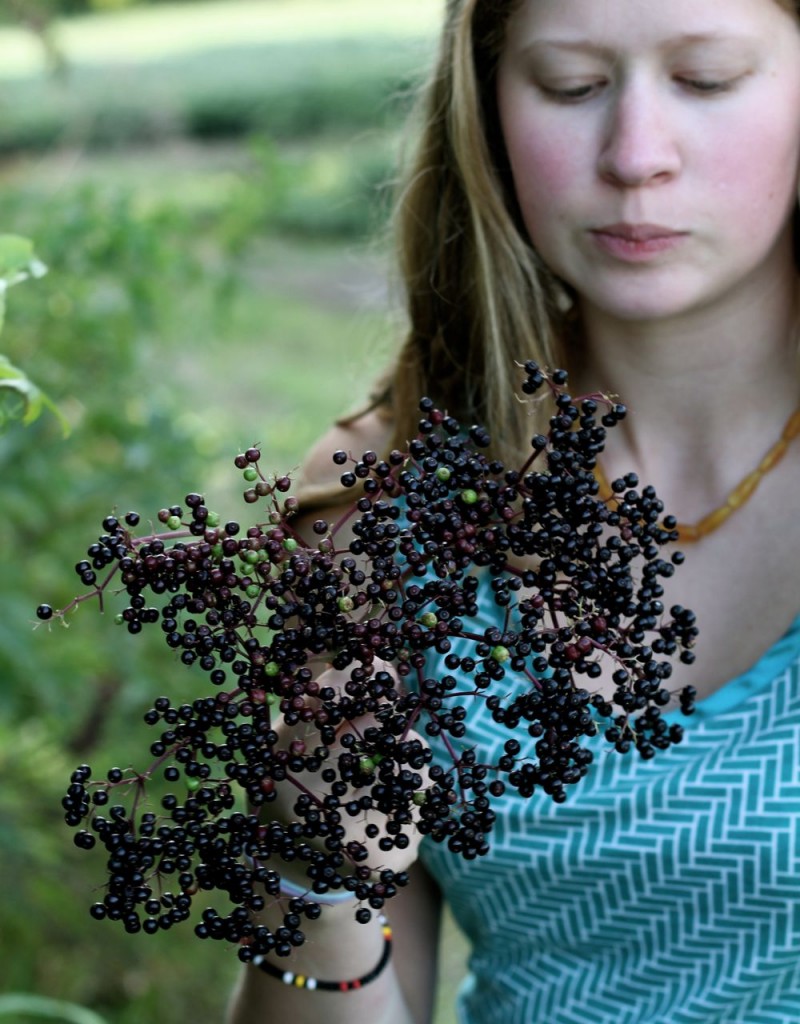
My cute daughter tasting elderberries.
This post was originally published in August 2015, and updated in August 2021.
These days it’s best to remember to grab a bag and stick it in my pocket before we go on an evening bike ride or walk. Chances are, I’ll spot a bush full of wild plums just turning pink, or a grove of elderberries that I didn’t know existed. And I know that if I take a few minutes to pick them and bring them home with me, I’ll have the makings of an excellent winter tonic, a delicious wine or fizzy drink, or a tasty, vibrant deep purple jelly.
Foraging for elderberries is as simple and low-tech as you can get. I regard the elderberry as a treasure that is well worth my time to seek out in the fall.
Here is everything you need to know about doing your own elderberry treasure-hunting.
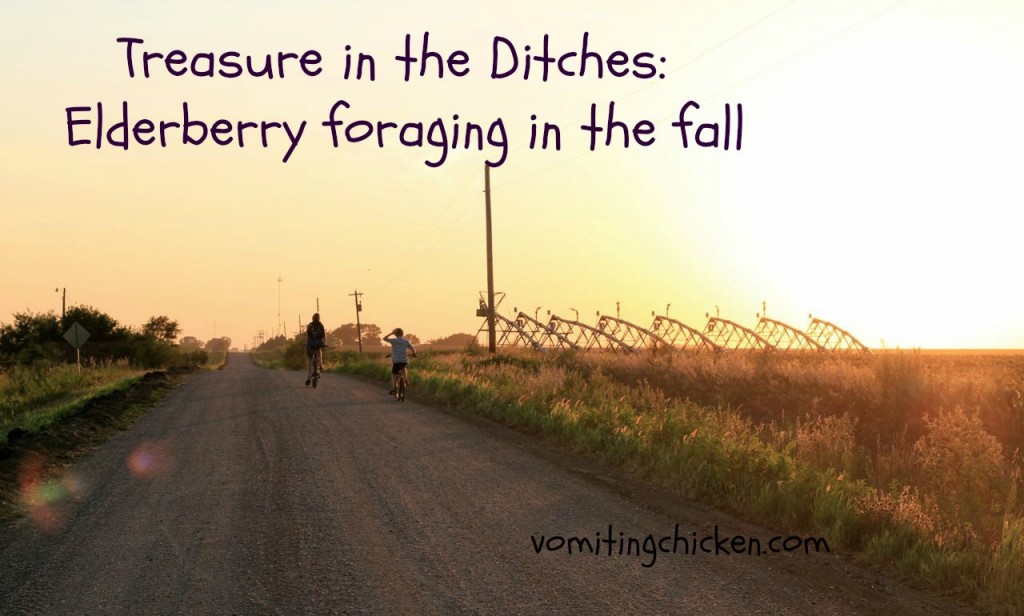
It’s Counterintuitive, but it’s true
Spring is the best time to watch for wild elderberries. That’s when the showy, creamy blossoms show off the location of the bushes. It is then that the savvy forager and lover-of-elderberries takes note and squirrels away these locations in the springtime-joy-filled brain, for future reference and foraging possibilities.
It’s also a great time to investigate who owns the land, and gain permission to pick. It is, indeed, worth a bit of brain storage (note-taking is smart too!) to remember the location of these bushes, because they aren’t so easy to spot in the fall, when you are racing the birds for first dibs on the berries. Not to mention the deer.
Or my little sister Anne. She is as devoted to elderberries and all the wonderful products you can make from them as I am. But we both have our favorite spots to pick.
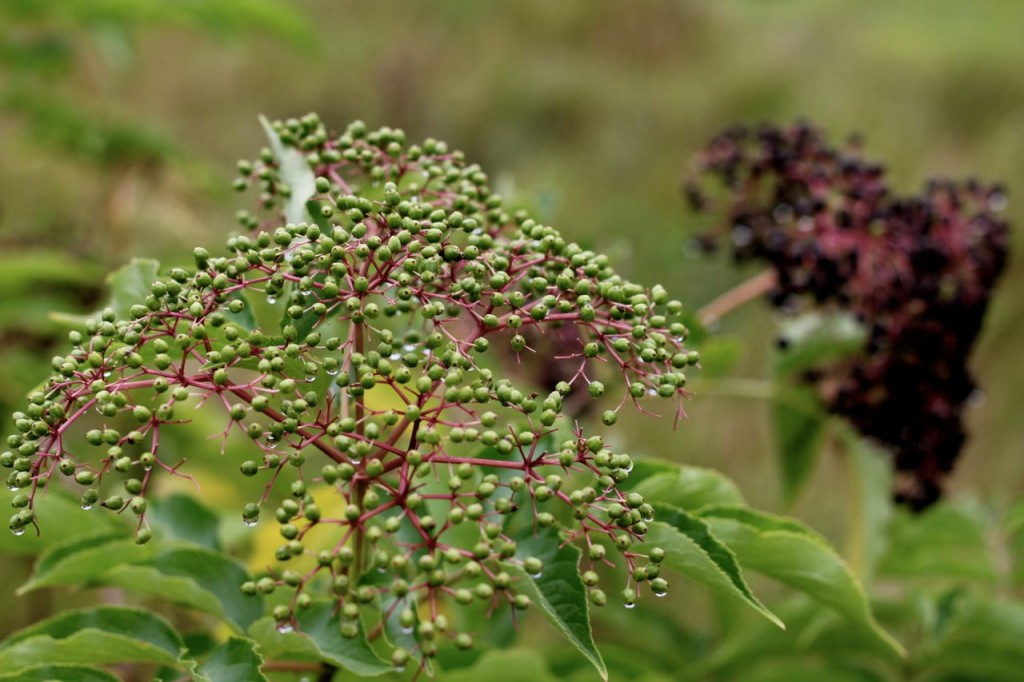
The berries get bigger and fatter and juicier as they ripen.
Oh the cleverness of elderberries!
The frothy cream-colored panicles of the elderberry bushes in May give way to tiny green buds, which then develop into fat purple berries by August. The heavy clusters of ripe berries tend to droop with the weight, making them, in the fall when they are ripe, much harder to spot.
Isn’t it so clever that the elderberries are ready to pick just as the weather begins to turn cool, and the seasonal colds and flus begin to make their way around? Elderberry winter tonic is my first defense against the seasonal viruses that go around. Didn’t know that something so wild and so easy to forage is so great for your health?
Now you do.
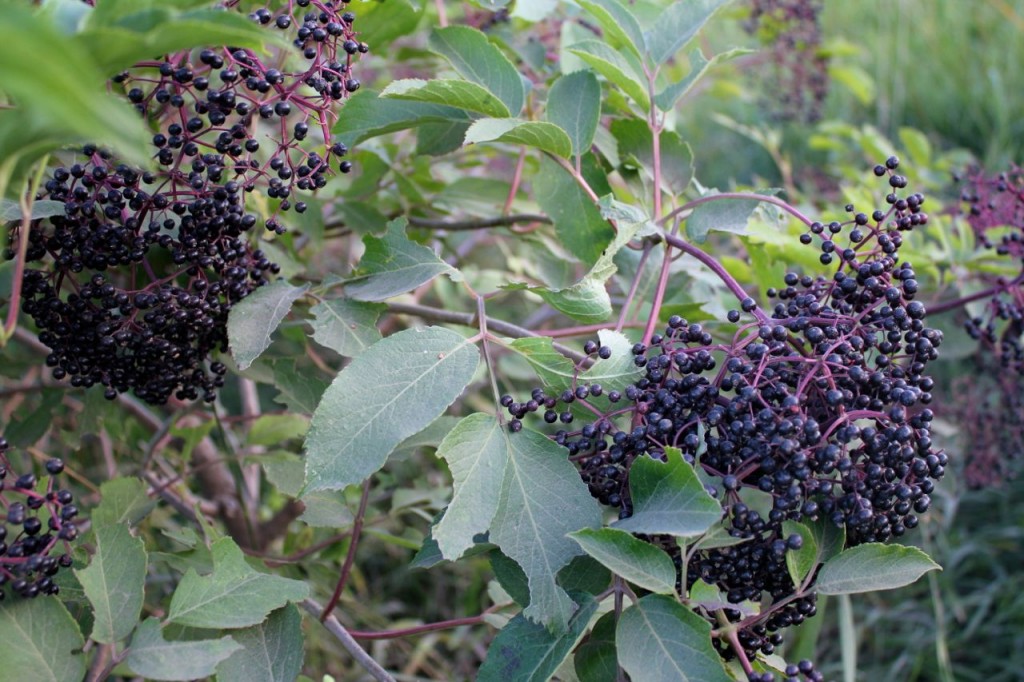
Pardon me as I geek out a little
But you’re going to want to know this, too. I know you, clever gentle reader, you.
Elderberries (Sambucus canadensis) have been a folk remedy for centuries in North America, Europe, Western Asia, and North Africa. The medicinal benefits of elderberries have been studied and rediscovered in many areas of the world as well. Elderberries are treasured for their antioxidant activity, and also are believed to help lower cholesterol, improve vision, boost the immune system, improve heart health and have been used to treat and prevent coughs, colds, flu, bacterial and viral infections. Most of these claims are based on folk remedies, though there have been studies done as well that have determined medicinal value of these berries.
So far elderberry research has revealed that bioflavonoids and other proteins in elderberry juice destroy the ability of cold and flu viruses to infect a cell. People with the flu who took elderberry juice in studies reported less severe symptoms and felt better much faster than those who did not.
There many good reasons why elderberry tonic is so popular among those who are proactive in keeping their families healthy. There are dozens of products you can buy, or you can get out there and pick your own elderberries and make your own!
Mountain Rose Herbs (affiliate link) is an excellent source if you’d like to order dried berries and make your own syrup. They have dried berries as well as many elderberry products. I trust that company completely, too, fyi.
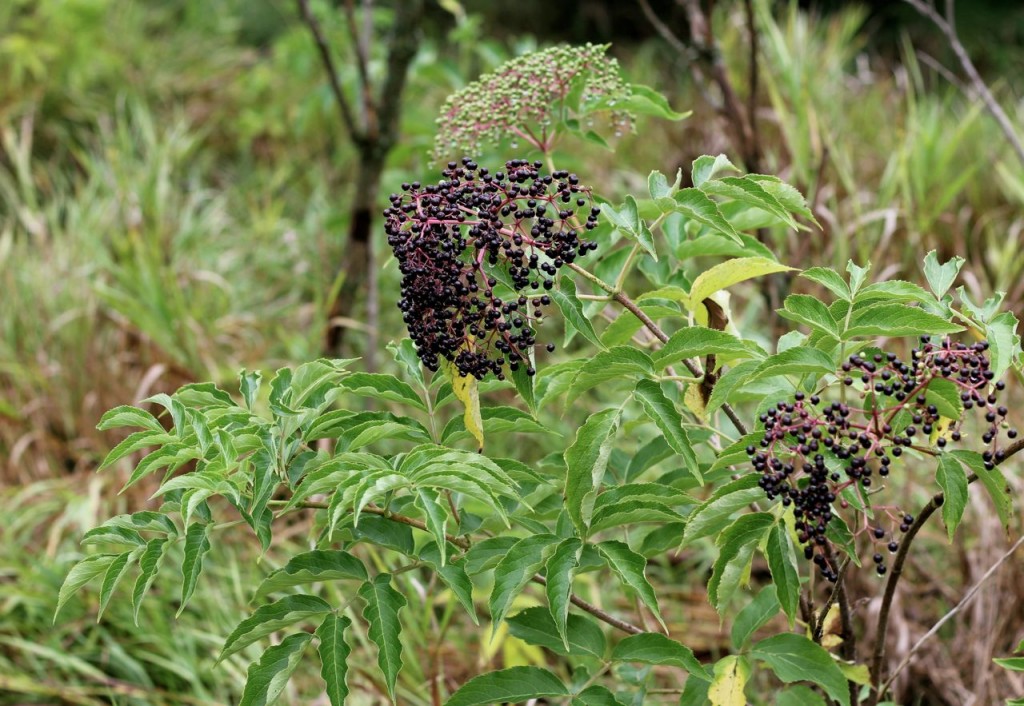
Does it seem too amazing that a wild berry can enhance your immune system? That your homemade pancake syrup can kill viruses? That the elderberry jelly you slather on your morning toast can curb a winter flu bug?
More elderberry geekery:
- At the Bundesforschungsanstalt (and I did not just make that up) Research Center for Food in Karlsruhe, Germany, scientists conducting studies on elderberries found that their anthocyanins enhance immune function by boosting the production of cytokines. (These proteins act as messengers in the immune system to help regulate immune response, thus helping to defend the body against disease.) Anthocyanins are hot stuff today in nutrition, and that’s why blueberries and those new blue and purple tinged tomatoes are so trendy (rightly so, I must add).
- Studies at Austria’s University of Graz have found that elderberry extract reduces LDL cholesterol.
- Hasassah’s Oncology Lab in Israel has determined that elderberries stimulate the body’s immune system and so they are treating cancer and AIDS patients with it. The wide range of medical benefits (from flu and colds to debilitating asthma, diabetes, and weight loss) is probably due to the enhancement of each individual’s immune system.
- In 1899, an American sailor accidentally discovered that cheap port wine colored with elderberries relieved his arthritis. This may have been the basis for a number of experiments on the healing properties of this fruit (reference).
- Antiviral components of elderberry fruit extract were tested and found to effectively inhibit Human Influenza A (H1N1 virus) in vitro, possibly by blocking the ability of the virus to infect host cells. The extract was so effective, that researchers compared it with the prescription medications Amantadine and Oseltamivir (Tamiflu) (reference).
A Personal request of sweet farmer-types
Here in the Midwest, where elderberries and other beneficial foods grow like weeds, we are in danger of losing many of them, because of the practices of clearing shelter belts and mowing ditch areas. As the kids and I have searched for elderberries this fall, I’ve come to really appreciate the farmers who will leave some wild areas be. (Do you hear me, sweet neighbor farmers? Leave the wild stuff in the ditches–please!)
The temptation to trim and tidy up the ditches and the awkward, hard-to-farm areas on farmland must be intense (not to mention use every last bit of farmland for row crops). But by leaving them be, farmers are providing valuable forage foods for folks like us, not to mention birds and other wildlife.
The deer probably don’t fully appreciate all those antioxidants, but I sure do.
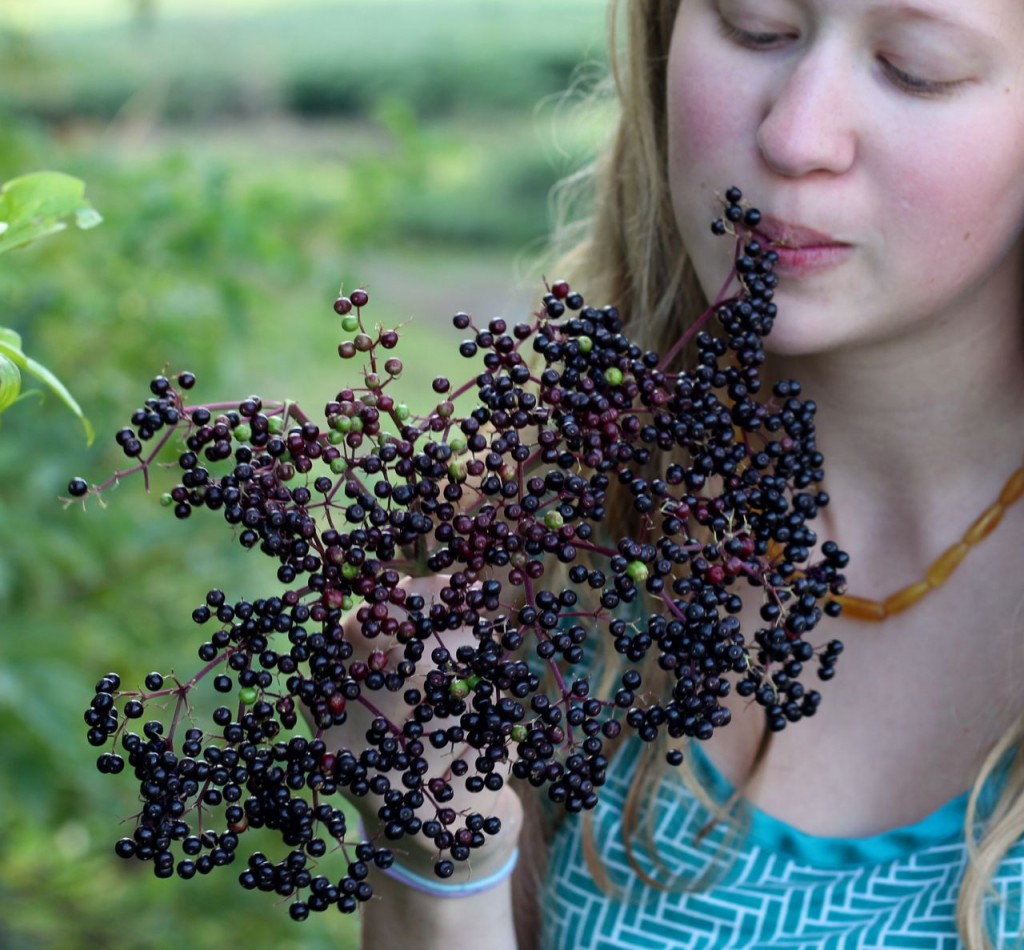
A few tips for foraging your own elderberries:
- Now’s the time to find them, in the Midwest, at least. Look for them in early to mid-August most years. You can clearly see the berry-laden bushes along the roadsides here in Nebraska. Elderberries don’t all ripen at once, so you will need to return to an area several times to harvest the berries as they ripen.
- Ask for permission, if you can locate the landowner. Every farmer–every single one–I’ve ever asked has shrugged and said “Sure, I don’t care, go for it.”
- Wear long pants and long sleeves and socks, and decent shoes! Elderberry-rich areas are also usually rich with poison ivy, nettles, thistles, chiggers, mosquitoes, and/or ticks. Also you may be climbing and slogging through tall grass, so leave the flip-flops at home.
- Spray your lower legs and feet for chiggers. Heed the advice of one who forgot one day and is still scratching (that. would. be. me.). 🙁
- You can use pruners to cut the bunches, but (after I forgot my pruners one time, I learned this) it’s easier to just break off the clumps of berries at the stem with your fingers. Then you don’t have to worry about losing your pruners either. 🙁 I break off the bunches and drop them in a cloth bag hanging from my arm. When the bag is full, I take it back to the car and grab another one.
- Speaking of losing things: if you’re on a serious elderberry foraging expedition, leave your favorite pair of sunglasses at home, and also secure your car keys (and cell phone, if you can’t leave it at home) someplace on your person, or better yet, leave them in the car. After a couple hours of foraging, when you discover that you dropped your ‘phone who knows where, you’ll wish you would have just left it someplace safe. Word to the wise, baby, word to the wise.
- Don’t overindulge on the fresh berries. Elderberries can be mildly toxic if eaten raw. The toxicity is cooked out of them. We all eat a few of them fresh, but if you eat many you could end up with a stomachache.
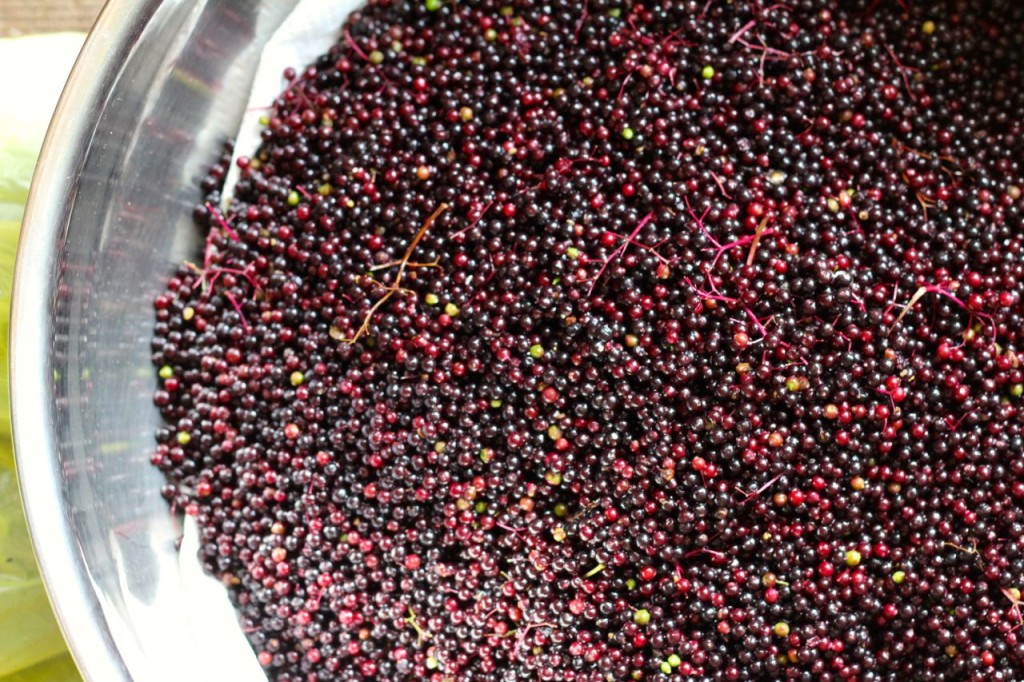
I sold my first picking of elderberries to one of my restaurant chefs, but I’m getting busy with the second picking. I’m planning to make elderberry kombucha, winter tonic (with elderberries and raw honey) and elderberry wine, if my time and the elderberries hold out that long. I’d also like to dry some for tea-making this winter. Oh, and I want to make elderberry syrup (pancakes!) and jelly (best toast ever!).
Better get busy at it! The days are getting shorter!
There really is treasure in the ditches
Honest.
Please check back later this week for a post with a recipe for my Elderberry Fall and Winter Tonic.
Here’s to wild elderberries! 🙂 (*glass clink*)
*hugs*
p.s. Thanks to astute Gentle Reader and Nebraska farmer’s wife and friend Kay, I’m reminded to add this note: if you forage in ditches or along farm fields, be aware that there’s always a possibility that your berries might have been sprayed with pesticide and wash well! (Thanks Kay!)
- How to prune basil for the longest, most abundant harvest: truly a game changer!
- How to make an Elderberry Winter Tonic: your virus-fighting tool!


*sigh* No elderberries in Southern California that I’m aware of.
Aww, I’m sorry Diane. You can order them, dried and ready to use.
I ordered mine from mountainroseherbs.com……..I also ordered some soap from them and it was lovely……
They are all over Southern California in the foothills and canyons. You just have to know what you are looking for.
Really? I’m a native & daughter of a native & never knew that. But we’re a coastal family, & the way traffic is now, it’s not worth the drive to even the closest foothills without knowing fairly specifically where to look…Southern CA covers a lot of acreage! I order dried ones from Mountain Rose Herbs when I want some. Not fresh, but then, I can grow tomatoes through the winter so I’m not complaining!
Gosh, I wouldn’t complain either Diane! Can’t imagine that.
Or, you can wait for a sadly neglected compost pile to grow your very own elderberry bush. That’s what I did. But it is a race with birds, even in my own garden.
Anne,
We planted a row of elderberries in our windbreak, which succumbed to winter kill a few years back, but the birds planted a nice bush next to the chicken yard and I still get lots of berries from it. Sometimes nature does take over, does it not?
Very well done, Amy. I am definitely bookmarking this posting and will be sharing the URL with everyone who asks me about elderberries in various other forums. And you have to stop using that gorgeous Amalia as a photo model! Totally distracts one from the elderberries!
ha! Next time I photograph her I’ll tell her to rub a little dirt on that pretty face, Gene, would that help?
Could you please tell us your recipe for the elderberry winter tonic? Would so appreciate it…..thanks Amy…………..
Hey Pat, I’m working on it and will try to get it posted today or tomorrow!
mmmm, mmmm! time to go a huntin ;0)
Agreed, Janelle!
I’m so horrible at identifying in the wild I’d probably pick something poisonous. I’ll leave it to experts like you!
Pingback: Elderberry winter tonic recipe and a giveaway! - vomitingchicken.com
i haven’t had the time to forage any yet, but another thought for u. Although u may do this already. Can in jelly jars. A pint goes bad for me too quickly. However u have a larger family at home than I do now, so maybe u use yours faster.
Looking forward to ur wild plum thoughts. I still don’t know how to tell when they are ready to harvest. And same caution on those, beware of sprayed bushes.
That’s a great idea, Kay! I’m always aware of watching for sprayed bushes–but how can you tell they are sprayed? Thoughts?
10 months later, I now see this. Sorry. The only way I know to tell if they have been sprayed with a herbicide is that they will be either dead or stunted. You know our lovely County road crew likes to do drive-by Round-up spraying. (GRRRRR). Pesticides (the nasty stuff that will really be bad to ingest. If it kills insects, it’ll probably hurt you too.) (not that herbicides won’t hurt you, they will if ingested, but not like a pesticide that is made to kill a living, moving thing.) Anyway…. Pesticides are usually used on Corn fields rather than on Soybean fields. Occasionally in the early spring, on Alfalfa fields. Personally, I would be leery of gleaning next to a corn field. I’d try to find a hay field or CRP ground or pasture. But that’s just me. 🙂
Thanks for those tips, Kay! The county road crews normally annoy me to no end, but this year they made me MAD. They sprayed all the wild plum thickets in our area (they usually just cut them off, but they do grow back, in time) that are anywhere near that shoulder of the roads. You can see the line of dead branches in the thickets and it’s just sad. I don’t think I’m the only motorist who enjoys the smell of wild plum blossoms when they are blooming, and also picks wild plums every summer.
Fascinating! and perfect timing for me. You might remember me from a wonderful Christmas angel surprise package you and some friends sent me last year. Life has been a challenge for me this year. A diabetes diagnosis. Now I’m waiting for confirmation of liver cancer that is already in my lymph nodes. I’ve ordered milk thistle for liver support and have reached out to Mountain Herbs for advice on the best way to add elderberries to my regimen. I’ve not yet decided if I’m going to do chemo or radiation. You are a smile to my day, Amy. Thank you.
Oh Cindi, of course I remember you–so fondly, too! It’s wonderful to hear from you! I am so sorry about your recent medical problems. I hope that Mountain Rose Herbs can help you. I will add you to my prayer list and will be praying for your health and healing. God bless you, dear lady!